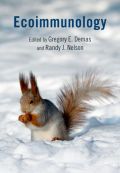
This book critically reviews recent advances in ecoimmunology, a newly emergent, interdisciplinary research field that examines interactions among host physiology and disease ecology in a wide range of environmentally relevant contexts. The role of parasites and pathogens in the evolution of life history traits is of increasing interest to both ecologists and evolutionary biologists. Immunology, which was once studied almost exclusively by immunologists, has become an important area of proximate investigation to animal physiologists as ameans for understanding changes in disease susceptibility and the neural and neuroendocrine mechanisms that mediate these changes. The coalescence of these different perspectiveshas given rise to the field of ecological immunology, an interdisciplinary research field that examines interactions among host physiology and disease ecology in a wide range of environmentally relevant contexts. The goal of ecological immunology is to understand immune function in the context oflife-history traits across a wide range of organisms. Research within the field combines diverse approaches from a wide range of scientific disciplines including evolution, ecology, and life history theory to endocrinology, neuroscience, molecular biology, and behavior. This book critically reviews recent advances in the discipline of ecoimmunology. Chapters are written by experts in their respective fields and cover diverse topics including how environmental factors can affect host immune function, the complex dynamics among host immunity, pathogen prevalence and disease susceptibility, and the physiological mechanisms that lead to adaptive changes in immune responses. By integrating analyses of immune system function withinanimal biology, investigatorswill gain will gain a more comprehensive and satisfying understanding of organism-environment interactions at both ultimate and proximate levels of analysis. 1. Introduction to ecoimmunology Gregory E. Demas and Randy J. Nelson Indiana University and the Ohio State University 2. Life history evolution, hormones, and avian immune function Dawn M. O'Neal and Ellen D. Ketterson Indiana University 3. Sickness behavior in vertebrates: Allostasis, life-history modulation, and hormonal regulation Noah T. Ashley and John C. Wingfield University of Alaska, Anchorage and University of California, Davis 4. Amphibian Immunity: Staying in tune with the environment Louise Rollins-Smith and Douglas Woodhams Vanderbilt University 5. Immunity in primates within a psychosocial and life span perspective Chris Coe University of Wisconsin 6. Maternal modulation of offspring immune function in vertebrates Dennis Hasselquist, Michael Tobler and Jan-ke Nilsson Lund University 7. Tradeoffs limiting MHC heterozygosity Jason L. Kubinak, Adam C. Nelson, James S. Ruff and Wayne K. Potts University of Utah 8. The energetics of immunity: Mechanisms of trade-offs in eco-immunology Gregory Demas, Timothy Greives, Emily Chester and Susannah French Indiana University, Max Planck Institute for Ornithology and Utah State University 9. Neuroendocrine mechanisms of seasonal changes in immune function Zachary M. Weil and Randy J. Nelson The Ohio State University 10. Pineal gland and circulatory melatonin in regulation of immune status ofseasonally breeding mammals C. Haldar, S. Gupta, S. Rai, R. Ahmed and R. Yadav Banaras Hindu University 11. Environmental challenges and the neuroendocrine mechanisms of stress-induced modulation of host resistance to microbial infection Jacqueline W. Mays, Nicole D. Powell, Michael T. Bailey and John F. Sheridan The Ohio State University 12. Inflammation and behavior Keith W. Kelley, Arnaud Aubert and Robert Dantzer University of Illinois at Urbana-Champaign, and DESCO, Facult des Sciences 13. The importance of physiology for ecoimmunlogy: Lessons from the insects Shelley Adamo Dalhousie University 14. Interactions between host social behavior, physiology, and disease susceptibility: the role of social context Bonnie Fairbanks and Dana Hawley Virginia Tech University 15. Sexual selection and parasites: Do mechanisms matter? Anne C. Jacobs and Marlene Zuk University of California, Riverside 16. Sex differences in immune responses to viruses Dionne P. Robinson and Sabra L. Klein Johns Hopkins Bloomberg School of Public Health 17. Immunopathology in ecological immunology E Rhiannon Pursall and Jens Rolff University of Sheffield 18. The evolutionary ecology of infectious disease virulence Lars Rberg and Martin Stjernman Lund University 19. Evolutionary genetics of infectious disease Paul Schmid-Hempel ETH Zurich
- ISBN: 978-0-19-973734-5
- Editorial: Oxford University
- Encuadernacion: Cartoné
- Páginas: 576
- Fecha Publicación: 05/01/2012
- Nº Volúmenes: 1
- Idioma: Inglés
